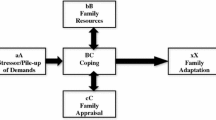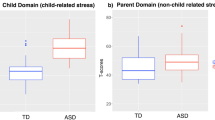Abstract
The factors predicting stress, anxiety and depression in the parents of children with autism remain poorly understood. In this study, a cohort of 250 mothers and 229 fathers of one or more children with autism completed a questionnaire assessing reported parental mental health problems, locus of control, social support, perceived parent–child attachment, as well as autism symptom severity and perceived externalizing behaviours in the child with autism. Variables assessing parental cognitions and socioeconomic support were found to be more significant predictors of parental mental health problems than child-centric variables. A path model, describing the relationship between the dependent and independent variables, was found to be a good fit with the observed data for both mothers and fathers.



Similar content being viewed by others
References
Altiere, M., & von Kluge, S. (2009). Family functioning and coping behaviors in parents of children with autism. Journal of Child and Family Studies, 18, 83–92.
Anderson, J. M., & Elfert, H. (1989). Managing chronic illness in the family—Women as caretakers. Journal of Advanced Nursing, 14, 735–743.
Aneshensel, C. S. (1992). Social stress: Theory and research. Annual Review of Sociology, 18, 15–38.
Argyrous, G. (2000). Statistics for social and health research. London: Sage.
Benjak, T. (2009). Comparative study on self-perceived health of parents of children with autism spectrum disorders and parents of non-disabled children in Croatia. Croatian Medical Journal, 50, 403–409.
Bentler, P. M. (1990). Comparative fit indexes in structural models. Psychological Bulletin, 107, 238–246.
Bitsika, V., & Sharpley, C. (2004). Stress, anxiety and depression among parents of children with ASD spectrum disorder. Australian Journal of Guidance and Counseling, 14, 151–161.
Blackledge, J. T., & Hayes, S. C. (2006). Using acceptance and commitment therapy training in the support of parents of children diagnosed with autism. Child & Family Behaviour Therapy, 28, 1–18.
Bowerman, B., & O’Connell, R. (1990). Linear statistical models: An applied approach. Boston: PWS-Kent Pub. Co.
Brown, T. A. (2006). Confirmatory factor analysis for applied research. New York: Guildford Press.
Busch, E. C. (2009). Using acceptance and commitment therapy with parents of children with autism: The application of a theory. ProQuest Dissertations and Theses 0622 (0971). Uni Dissertation Publishing.
Campis, L. K., Lyman, R. D., & Prentice-Dunn, S. (1986). The parental locus of control scale: Development and validation. Journal of Clinical Child Psychology, 15, 260–267.
Civick, P. (2008). Maternal and paternal differences in parental stress levels and marital satisfaction levels in parents of children diagnosed with autism spectrum disorders. ProQuest Dissertations and Theses 0622 (0925). Umi Dissertation Publishing.
Crawford, J. R. (2007). sbdiff.exe [Computer software].
Davis, N. O., & Carter, A. S. (2008). Parenting stress in mothers and fathers of toddlers with autism spectrum disorders: Associations with child characteristics. Journal of Autism and Developmental Disorders, 38, 278–1291.
Duarte, C. S., Bordin, I. A., Yazigi, L., & Mooney, J. (2005). Factors associated with stress in mothers of children with autism. Autism, 9, 416–427.
Farrugia, D. (2009). Exploring stigma: Medical knowledge and the stigmatisation of parents of children diagnosed with autism spectrum disorder. Sociology of Health & Illness, 31, 1011–1027.
Field, A., Miles, J., & Field, Z. (2012). Discovering statistics using R. Los Angeles, CA: Sage.
Fiske, K. (2009). A cross-sectional study of patterns of renewed stress among parents of children with autism. ProQuest Dissertations and Theses 0621 (0190).
Frank, N. C., Brown, R. T., Blount, R. L., & Bunke, V. (2001). Predictors of affective responses of mothers and fathers of children with cancer. Psycho-Oncology, 10, 293–304.
Gerard, A. B. (1994). Parent–child relationship inventory (PCRI) manual. Los Angeles, CA: Western Psychological Services.
Goodman, R. (2001). Psychometric properties of the Strengths and Difficulties Questionnaire (SDQ). Journal of the American Academy of Child and Adolescent Psychiatry, 40, 1337–1345.
Gray, D. E. (2003). Gender and coping: The parents of children with high functioning autism. Social Science and Medicine, 56, 631–642.
Gray, D. E., & Holden, W. J. (1992). Psycho-social well-being among the parents of children with autism. Australia and New Zealand Journal of Developmental Disabilities, 18, 83–93.
Hartley, S. L., Barker, E. T., Seltzer, M. M., Floyd, F., Greenberg, J., Orsmond, G., et al. (2010). The relative risk and timing of divorce in families of children with an autism spectrum disorder. Journal of Family Psychology, 24, 449–457.
Hassall, R., Rose, J., & McDonald, J. (2005). Parenting stress in mothers of children with an intellectual disability: The effects of parental cognitions in relation to child characteristics and family support. Journal of Intellectual Disability Research, 49, 405–418.
Hastings, R. P., & Johnson, E. (2001). Stress in UK families conducting intensive home-based behavioral intervention for their young child with autism. Journal of Autism and Developmental Disorders, 31, 327–336.
Hastings, R. P., Kovshoff, H., Ward, N. J., Degli Espinosa, F., Brown, T., & Remington, B. (2005). Systems analysis of stress and positive perceptions in mothers and fathers of pre-school children with autism. Journal of Autism and Developmental Disorders, 35, 635–644.
Henry, J. D., & Crawford, J. R. (2005). The short-form version of the Depression Anxiety Stress Scales (DASS-21): Construct validity and normative data in a large non-clinical sample. British Journal of Clinical Psychology, 44, 227–239.
Hoppes, K., & Harris, S. (1990). Perceptions of child attachment and maternal gratification in mothers of children with autism and Down syndrome. Journal of Clinical Child Psychology, 19, 365–370.
Hu, L., & Bentler, P. M. (1999). Cutoff criteria for fit indexes in covariance structure analysis: Conventional criteria versus new alternatives. Structural Equation Modeling, 6, 1–55.
Keen, D., et al. (2010). The effects of a parent-focused intervention for children with a recent diagnosis of autism spectrum disorder on parenting stress and competence. Research in Autism Spectrum Disorders, 4, 229–241.
Kuusikko-Gauffun, S., Pollock-Wurman, R., Mattila, M.-L., Jussila, K., Ebeling, H., Pauls, D., et al. (2013). Social anxiety in parents of high-functioning children with autism and Asperger Syndrome. Journal of Autism and Development Disorders, 43, 521–529.
Lamminen, L. (2008). Family functioning and social support in parents of children with Autism Spectrum Disorders, ProQuest Dissertations and Theses, 0519(0102).
Lecavalier, L., Leone, S., & Wiltz, J. (2005). The impact of behaviour problems on caregiver stress in young people with autism spectrum disorders. Journal of Intellectual Disability Research, 3, 172–183.
Lee, G. K. (2009). Health-related quality of life of parents of children with high-functioning Autism Spectrum Disorders. Focus on Autism and Other Developmental Disabilities, 24, 227–239.
Lord, C., Rutter, M., & Le Couteur, A. (1994). Autism Diagnostic Interview-Revised: A revised version of a diagnostic interview for caregivers of individuals with possible pervasive developmental disorders. Journal of Autism and Developmental Disorder, 25, 659–685.
Lovibond, S., & Lovibond, P. (1995). Manual for the Depression Anxiety Stress Scales (2nd ed.). Sydney: Psychology Foundation.
MacCallum, R. C., Browne, M. W., & Sugawara, H. M. (1996). Power analysis and determination of sample size for covariance structure modeling. Psychological Methods, 1, 130–149.
Macintosh, K., & Dissanayake, C. (2006). Social skills and problem behaviours in school-aged children with high-functioning autism and Asperger’s disorder. Journal of Autism and Developmental Disorders, 36, 1065–1076.
Menard, S. (2002). Applied logistic regression analysis (2nd ed.). California: Sage Publications.
Micali, N., Chakrabarti, S., & Fombonne, E. (2004). The broad autism phenotype: Findings from an epidemiological survey. Autism, 8, 21–37.
Moore, T. R. (2009). Adherence to behavioral and medical treatment recommendations by parents of children with autism spectrum disorders. Journal of Autism and Developmental Disorders, 39, 1173–1184.
Muthén, L. K., & Muthén, B. O. (2010). Mplus user’s guide (3rd ed.). Los Angeles, CA: Muthén and Muthén.
Myers, B. J. (2009). “My Greatest Joy and My Greatest Heart Ache:” Parents’ own words on how having a child in the autism spectrum has affected their lives and their families’ lives. Research in Autism Spectrum Disorders, 3, 670–684.
Rogers, M. L. (2008). Can marital satisfaction of parents raising children with autism be predicted by child and parental stress. ProQuest Dissertation and Theses, 0451 (1389).
Rutter, M., Bailey, A., & Lord, C. (2003). SCQ: Social Communication Questionnaire. Los Angeles, CA: Western Psychological Services.
Satorra, A., & Bentler, P. M. (2001). A scaled difference Chi square test statistic for moment structure analysis. Psychometrika, 66, 507–514.
Schieve, L. A., Blumberg, S. J., Rice, C., Visser, S. N., & Boyle, C. (2007). The relationship between autism and parenting stress. Pediatrics, 119, 114–121.
Sharpley, C. F., Bitsika, V., & Efremidis, B. (1997). Influence of gender, parental health, and perceived expertise of assistance upon stress, anxiety, and depression among parents of children with autism. Journal of Intellectual and Developmental Disability, 22, 19–28.
Singer, G. (2006). Meta-analysis of comparative studies of depression in mothers of children with and without developmental disabilities. American Journal on Mental Retardation, 111, 155–169.
Tabachnik, B. G., & Fidell, S. L. (2012). Using multivariate statistics (6th ed.). New York: Harper Collins.
Thoits, P. A. (1991). Gender differences in coping emotional distress. In J. Eckenrode (Ed.), The social context of coping (pp. 107–138). New York: Plenum Press.
Tomanik, S., Harris, G. E., & Hawkins, J. (2004). The relationship between behaviours exhibited by children with autism and maternal stress. Journal of Intellectual and Developmental Disability, 29, 16–26.
Tonge, B., Brereton, A., Kiomall, M., Mackinnon, A., King, N., & Rinehart, N. (2006). Effects on parental mental health of an education and skills training program for parents of young children with autism: A randomized controlled trial. Journal of the American Academy of Child and Adolescent Psychiatry, 45, 561–569.
Woodgate, R. L., Ateah, C., & Secco, L. (2008). Living in a world of our own: The experience of parents who have a child with autism. Qualitative Health Research, 18, 1075–1083.
Wright, B., & Williams, C. (2007). Intervention and support for parents and carers of children and young people on the autism spectrum: A resource for trainers child. London: Kingsley Publishers.
Acknowledgments
The authors wish to acknowledge the support of the University of Tasmania in completing this study. The authors also wish to acknowledge the time taken and vital contribution made by the study participants.
Ethical standard
The research associated with this article abides by the ethical standards laid down by the 1964 Declaration of Helsinki and its later amendments. Ethics approval was granted prior to commencement of the study.
Informed consent
All participants gave their informed consent prior to their inclusion in this study.
Author information
Authors and Affiliations
Corresponding author
Rights and permissions
About this article
Cite this article
Falk, N.H., Norris, K. & Quinn, M.G. The Factors Predicting Stress, Anxiety and Depression in the Parents of Children with Autism. J Autism Dev Disord 44, 3185–3203 (2014). https://doi.org/10.1007/s10803-014-2189-4
Published:
Issue Date:
DOI: https://doi.org/10.1007/s10803-014-2189-4




